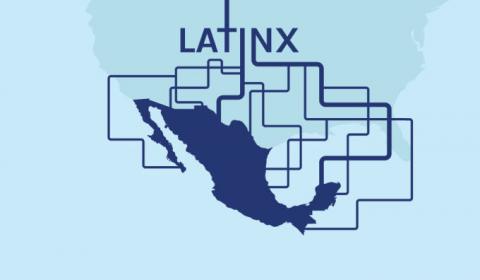If you’ve been online at all in the past year, you’ve probably seen the word "Latinx" and thought: What does it mean?
Latinx (pronounced “La-TEEN-ex”) is a gender-inclusive way of referring to people of Latin American descent. Used by activists andsome academics, the term is gaining traction among the general public, after having been featured in publications such as NPR to Latina. But where did Latinx originate, and is everybody on board with using it?
Ungendering the Spanish language
Spanish is a gendered language, which means that every noun has a gender (in general, nouns that end in "a" tend to be feminine, and nouns that end in "o" tend to be masculine). While some nouns keep their gender when they become plural, others change based on the gender composition of a given group of people.
This approach, however, always defers to the masculine as the dominant gender. For example, if you had a room full of girlfriends, it'd be full of amigas, with the "a" denoting everyone's gender as female. But the entire group's gender changes as soon as one guy enters the room, making it full of amigos; the "o" denotes the presence of at least one man—no matter how many women are in the room. Some members of Latin American communities claim this gendered language reinforces patriarchal and heterosexist norms, so "Latin@" was later introduced as a way to push back against it.
Using “@” as a suffix became a way to represent male and female genders. Instead of amigas or amigos, it was amig@s. But the term, which was adopted by left-leaning activists and even used in academic texts, didn't include genderqueer and gender-nonconforming people. Consequently, Latin@ began to hit its limit, as those who didn’t conform to the male-female gender binary gained more visibility.
The rise of Latinx
According to Google Trends data, Latinx began emerging as early as 2004, but really started popping up in online searches some time in late 2014. During this period, the term had mostly been used in left-leaning and queer communities as a way to promote inclusivity in language. But thanks to social media users on sites like Tumblr and Twitter, Latinx gained a foothold by mid-2015, and its use began spreading beyond LGBTQIA communities.
“Once the term ‘Latinx’ was made more visible, it certainly aligned with what I had been learning about gender non-conformity,” Filiberto Nolasco Gomez, founder of Latin American culture blog El Huateque, told NTRSCTN. “It seemed like the right direction for my website to embrace ‘Latinx’ as a political statement and a dismantling of binaries.”
By dismantling some of the gendering within Spanish, Latinx helped modernize the idea of a pan-Latin American experience—or Latinidad—one that reflects what it means to be of Latin American descent in today’s world. The term also better reflects Latin America's diversity, which is more in line with intersectionality, the study of the ways that different forms of oppression (e.g. sexism, racism, classism, and heterosexism) intersect.
“The use of the 'x' is really important to me,” Chicanx performance artist Artemisa Clark told NTRSCTN. “The 'x' shows a development of broader Latinx movements, one more actively concerned with issues of gender and queerness.”
Continuing reading at Complex.
COMPLEX is a community of creators and curators armed with the Internet, and committed to surfacing the most relevant conversations—sourced from both multi-cultures and the multicultural—that define our new America.


Spread the word